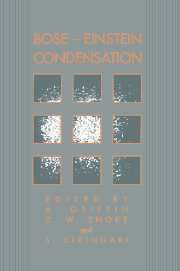Preface
Published online by Cambridge University Press: 15 December 2009
Summary
In recent years, the phenomenon of Bose-Einstein condensation (BEC) has become an increasingly active area of research, both experimentally and theoretically. Long associated with the study of superfluid 4He and 3He-4He mixtures, current research increasingly deals with other condensed matter systems, including spin-polarized hydrogen, excitons, laser-cooled atoms, high-temperature superconductors, and subatomic matter.
The present volume contains a series of authoritative review articles on current BEC research and related phenomena. The editors invited the leading experts to review their research field in such a way that their articles would introduce non-experts to current research and at the same time highlight some of the most promising topics for study in the next decade. These articles contain new material which is not available elsewhere. This is the first book devoted to BEC as an inter-disciplinary subject in its own right. It covers research in atomic and molecular physics, laser physics, low temperature physics, subatomic physics and astrophysics.
In the opening chapter, Snoke and Baym introduce the various review articles by discussing them in the context of the dominant themes in current BEC studies. These themes include broken gauge invariance, phase coherence in equilibrium and non-equilibrium situations, time scales for the formation of a Bose condensate, Bose particles with a finite lifetime, and BEC vs. BCS superfluidity in fermionic systems with attractive interactions.
The interdisciplinary character of modern BEC research has led to its being largely ignored by the regular low temperature conferences.
Information
- Type
- Chapter
- Information
- Bose-Einstein Condensation , pp. xi - xiiiPublisher: Cambridge University PressPrint publication year: 1995
Accessibility standard: Unknown
Why this information is here
This section outlines the accessibility features of this content - including support for screen readers, full keyboard navigation and high-contrast display options. This may not be relevant for you.Accessibility Information
- 2
- Cited by
